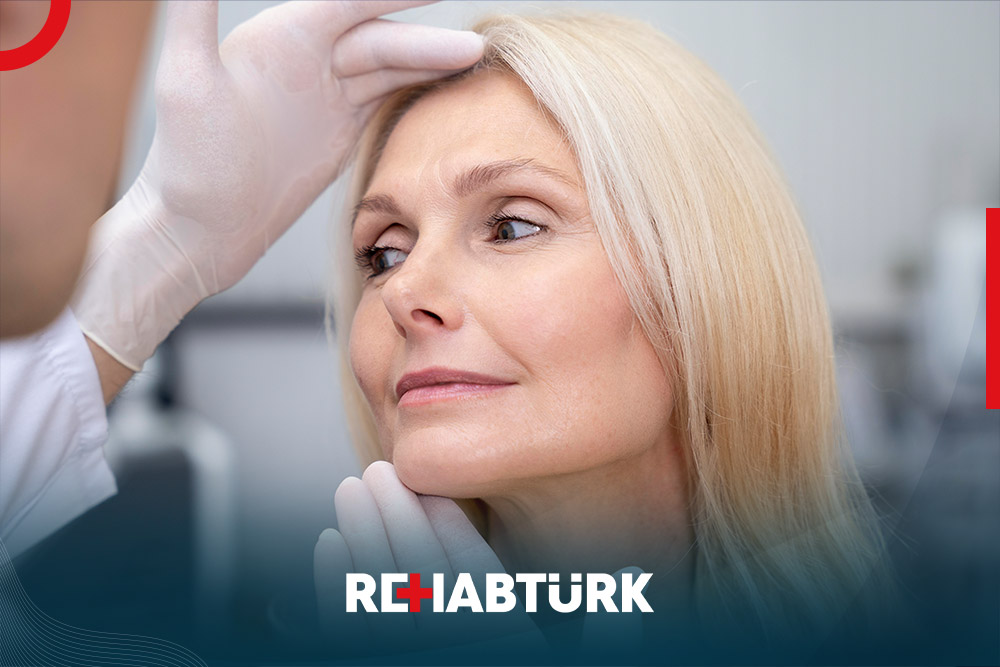Facelift in Türkiye
A facelift focuses on the lower two-thirds of the face, mostly on the neck. People undergo facelifts for many different reasons. The common reason is to help hide the signs of aging.
With age, skin and tissues naturally lose their elasticity. This leads to sagging and wrinkles. A facelift, also known as a rhinectomy, is a surgical procedure that lifts and tightens facial tissue.
A facelift can include removing excess skin, smoothing folds or wrinkles, and tightening facial tissue. This does not include a brow or eye lift, although it can be done at the same time.
Among the good candidates for a facelift are:
- Healthy people without medical conditions that may interfere with wound healing or prevent recovery from surgery.
- Those who do not smoke or abuse substances.
- Those who have realistic expectations of what surgery entails.

How does a facelift work?
During a lift, the surgeon repositions the fat and tissue under the skin to:
- Help smooth wrinkles
- Remove excess skin
- Lifting and tightening of facial skin
What are the procedures for the operation?
Facelifts vary according to the desired results.
Traditionally, an incision is made in the hairline near the temples. The incision extends in front of the ear, down to the earlobe, and then back under the scalp behind the ears.
Excess skin and fat can be removed or redistributed across the face. The underlying muscles and connective tissue are redistributed and tightened. If there is minimal sagging of the skin, a “partial” facelift can be performed. This involves shorter incisions.
In the event that a neck lift is also performed, excess skin and fat are removed. The skin on the neck is pulled up and toward the back, often through an incision just below the chin.
Incisions often contain dissolvable sutures or dermal glue. In some cases, the patient may need to return to the hospital to have the stitches removed. The incisions are made in a way that blends with the hairline and facial structure.
A surgical drainage tube is often used after surgery in addition to the application of face-covering bandages.
Are there risks or side effects?
There are always risks with any medical procedure, including a facelift. Risks may include:
- Anesthesia risks
- Bleeding
- infection
- heart problems
- blood clots
- pain or scarring
- Hair loss at the incision site
- prolonged swelling
- Wound healing problems
Therefore, you should talk to your doctor about all the risks involved in a facelift to ensure that the procedure is appropriate.
What after a facelift?
The doctor will likely prescribe painkillers after surgery. The patient may feel some pain or discomfort with swelling and bruising. And all this is normal.
The doctor gives instructions about when to remove any dressings or drainage tubes and when to schedule a follow-up appointment.
Once the swelling goes down, the patient can see the difference in appearance. This is when the patient feels that his skin condition has become normal, and this usually takes several months.
You should stop about two weeks before resuming a normal level of daily activity. But when there is strenuous activity, such as performing some strenuous exercise, you must wait about four weeks. Every person is different, so ask your doctor when you can resume your usual activities.
To help prolong the results of a facelift, it is important to moisturize your face daily, protect it from the sun, and maintain a healthy life in general.
Facelift results are not guaranteed. A patient may not get the desired results from a single surgery. Sometimes a second surgery is necessary.
Talk to your doctor about what you can do to help ensure a successful facelift and what you can reasonably expect from the surgery.
Preparing for a facelift
Preparing for a facelift is similar to preparing for any other kind of surgery. Before surgery, the doctor orders blood tests or a preoperative evaluation. The patient may be asked to stop taking certain medications or adjust the dose before the procedure.
The doctor may also order:
- stop smoking.
- Discontinue use of aspirin, anti-inflammatory pain relievers, and any herbal supplements to reduce the risk of bleeding and bruising.
- Putting certain products on the face before the procedure.
Whether the procedure is performed in a surgical center or a hospital, the patient will need someone to drive them to and from surgery as the patient will likely be under general anesthesia. It is a good idea to arrange for someone to stay with the patient for one or two nights.
How do you do this operation in Türkiye?
Often, insurance won’t pay for a face-lift because it’s considered a cosmetic procedure. Therefore, you do not have to order the procedure through health insurance providers.
What you should do is make sure that the operation is performed by a certified, well-known and experienced surgeon. This ensures that certain standards of education, experience, continuing education and best practices are upheld.
Therefore, you can start by contacting REHABTÜRK HEALTHCARE PROVIDER NETWORK, which provides you with the best certified plastic surgeons in Türkiye with long experience and high skill.
And if you have friends or family members who have had plastic surgery in the past, this might be a good place to start. Ask them if they are satisfied with their wounds. And do your research. To make sure you choose a doctor that you feel comfortable with.
You may want to see more than one plastic surgeon and get a second or third opinion. An informed decision is a smart decision.
How can I book a facelift in Türkiye?

- Free medical support on the phone: You will have a dedicated representative for your health condition who is always ready to answer your questions.
- Free consultation with a specialist doctor: Your medical representative will consult with a number of doctors and hospitals to find the best possible treatments.
- Free travel visa arrangement: We will contact the embassy in your country to assist you in obtaining a visa to visit Türkiye.
- Free itinerary planning: We will create a schedule for your medical trip to Türkiye.
- Free translation of documents and reports: We will translate medical documents and reports into Turkish on your behalf.
- Free support and monitoring: We will monitor the stages of treatment and be by your side every step of the way.
- Free instant translation: We will be with you during the treatment stages to provide translation between you and the medical team.
- Free accommodation and transportation coordination: We will book accommodation for you and your companions in Türkiye, along with transportation services.
Contact REHABTÜRK doctors for more information about the procedure and to evaluate your medical condition.
